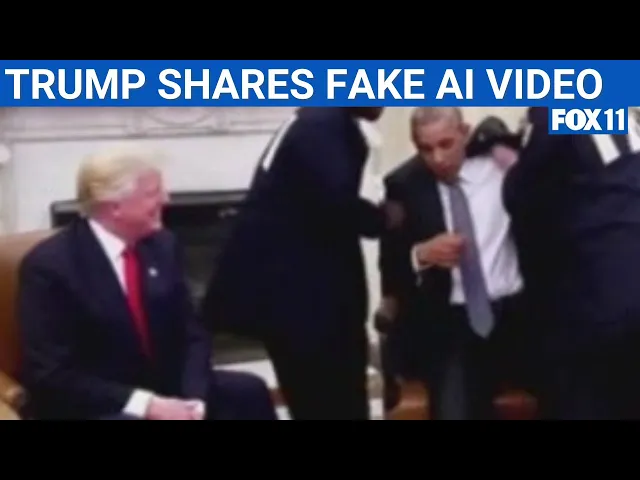Trump shares fake AI video Obama arrest

Trump shares fake Obama arrest video
Donald Trump has pushed disinformation into new territory by sharing an AI-generated video purporting to show former President Barack Obama being arrested. The video, which spread quickly across social media, exemplifies the emerging threats posed by synthetic media in our political discourse. As we approach the 2024 election cycle, this incident highlights the urgent challenges we face at the intersection of artificial intelligence, social media, and political campaigning.
The weaponization of AI in politics
-
Synthetic media has officially entered presidential politics – Trump's sharing of the fake Obama arrest video marks a significant escalation in how AI-generated content is being deployed by major political figures. The video showed what appeared to be Obama being detained by law enforcement, a completely fabricated scenario created using AI tools.
-
Detection technology remains inadequate – Despite advances in AI detection tools, the video spread widely before being identified as synthetic. Most social media platforms lack robust systems to identify and flag AI-generated content, allowing manipulated media to reach millions before any corrective action occurs.
-
Platform policies are inconsistently applied – While some platforms eventually labeled the video as misleading, the response was neither uniform nor swift. The incident exposed significant gaps in how different social media companies handle synthetic political content and enforce their own stated policies.
-
Public vulnerability to AI deception remains high – The video gained significant traction because it leveraged existing political tensions and appeared authentic enough to many viewers. Research shows that even when people are warned about the existence of deepfakes, they still struggle to identify them in real-world scenarios.
When AI meets political weaponization
The most concerning aspect of this incident isn't the technology itself, but how it's being weaponized by those with significant influence. When a presidential candidate with millions of followers shares synthetic content designed to mislead voters about a political opponent, we've crossed a threshold that democracy wasn't designed to handle.
This matters profoundly because it accelerates the erosion of shared reality. Political discourse requires some baseline of agreed-upon facts to function effectively. When synthetic media becomes a campaign tool deployed by the highest-profile candidates, it fundamentally changes how voters process information. The resulting epistemic crisis doesn't just change opinions – it alters how we form them in the first place.
The broader implications
What the video didn
Recent Videos
How To Earn MONEY With Images (No Bullsh*t)
Smart earnings from your image collection In today's digital economy, passive income streams have become increasingly accessible to creators with various skill sets. A recent YouTube video cuts through the hype to explore legitimate ways photographers, designers, and even casual smartphone users can monetize their image collections. The strategies outlined don't rely on unrealistic promises or complicated schemes—instead, they focus on established marketplaces with proven revenue potential for image creators. Key Points Stock photography platforms like Shutterstock, Adobe Stock, and Getty Images remain viable income sources when you understand their specific requirements and optimize your submissions accordingly. Specialized marketplaces focusing...
Oct 3, 2025New SHAPE SHIFTING AI Robot Is Freaking People Out
Liquid robots will change everything In the quiet labs of Carnegie Mellon University, scientists have created something that feels plucked from science fiction—a magnetic slime robot that can transform between liquid and solid states, slipping through tight spaces before reassembling on the other side. This technology, showcased in a recent YouTube video, represents a significant leap beyond traditional robotics into a realm where machines mimic not just animal movements, but their fundamental physical properties. While the internet might be buzzing with dystopian concerns about "shape-shifting terminators," the reality offers far more promising applications that could revolutionize medicine, rescue operations, and...
Oct 3, 2025How To Do Homeless AI Tiktok Trend (Tiktok Homeless AI Tutorial)
AI homeless trend raises ethical concerns In an era where social media trends evolve faster than we can comprehend them, TikTok's "homeless AI" trend has sparked both creative engagement and serious ethical questions. The trend, which involves using AI to transform ordinary photos into images depicting homelessness, has rapidly gained traction across the platform, with creators eagerly jumping on board to showcase their digital transformations. While the technical process is relatively straightforward, the implications of digitally "becoming homeless" for entertainment deserve careful consideration. The video tutorial provides a step-by-step guide on creating these AI-generated images, explaining how users can transform...
